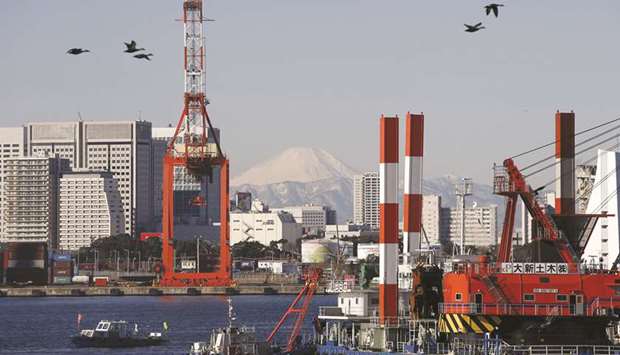Japanese business sentiment worsened in February to levels last seen in late 2016, the Reuters Tankan poll showed, in a sign companies took a hit from weakening demand both at home and abroad in the face of slowing global growth and trade friction.
The monthly poll, which tracks the Bank of Japan’s (BoJ) closely watched quarterly tankan survey, found manufacturers’ mood sliding for a fourth straight month and service-sector morale falling for the first time in four months.
The worsening business sentiment underscores the risks Japan’s economy – the world’s third-largest – faces this year, including an intensifying US-China trade war and a planned nationwide sales tax hike in October.
Both manufacturers’ and non-manufacturers’ sentiment is expected to slip further over the coming three months, boding ill for the central bank’s key tankan survey due next in April.
“Capital expenditure is being put off due to the US-China trade war and slowdown in Chinese economy,” a manager of a machinery maker wrote in the survey.
Managers of 266 firms responded on condition of anonymity in the Reuters poll of 480 large and midsize companies, conducted February 1-14.
“Business conditions are not so good because of slumping private consumption at home and a slowdown in the Chinese economy,” a manager of a textile maker wrote in the survey.
The sentiment index for manufacturers fell to 13 in February from 18 seen in the previous month, dragged down by electrical machinery makers and industrial materials producers including oil refinery, steel and chemicals, the Reuters Tankan showed.
The index marked the weakest reading since October 2016, and is expected to fall further to 12 in May.
The service-sector index dropped sharply to 22 in February from 31 in the previous month, weighed by retailers, a worrying sign for consumption, which makes up about 60% of the economy.
The index is seen falling further to 20 in May.
Fragile consumer spending could be a source of concern for policymakers who are taking steps to ensure the twice-delayed sales tax hike to 10% from the current 8% will go ahead in October, as the 2014 tax hike hit consumers hard.
Japan’s economy rebounded in the fourth quarter as business and consumer spending pulled back from the slump caused by natural disasters, although analysts expect trade friction and a planned sales tax hike to dampen growth in 2019.
The BoJ’s last tankan in December showed the business mood held steady from three months ago, but companies saw conditions worsening ahead as the US-Sino trade war and slowdown in China – Japan’s largest trading partner – hurts corporate activity.
The Reuters Tankan indexes are calculated by subtracting the percentage of pessimistic respondents from optimistic ones.
A negative figure means pessimists outnumber optimists.

A crane is seen at a port in Tokyo. Japanese business sentiment worsened in February to levels last seen in late 2016, the Reuters Tankan poll showed, in a sign companies took a hit from weakening demand both at home and abroad in the face of slowing global growth and trade friction.
